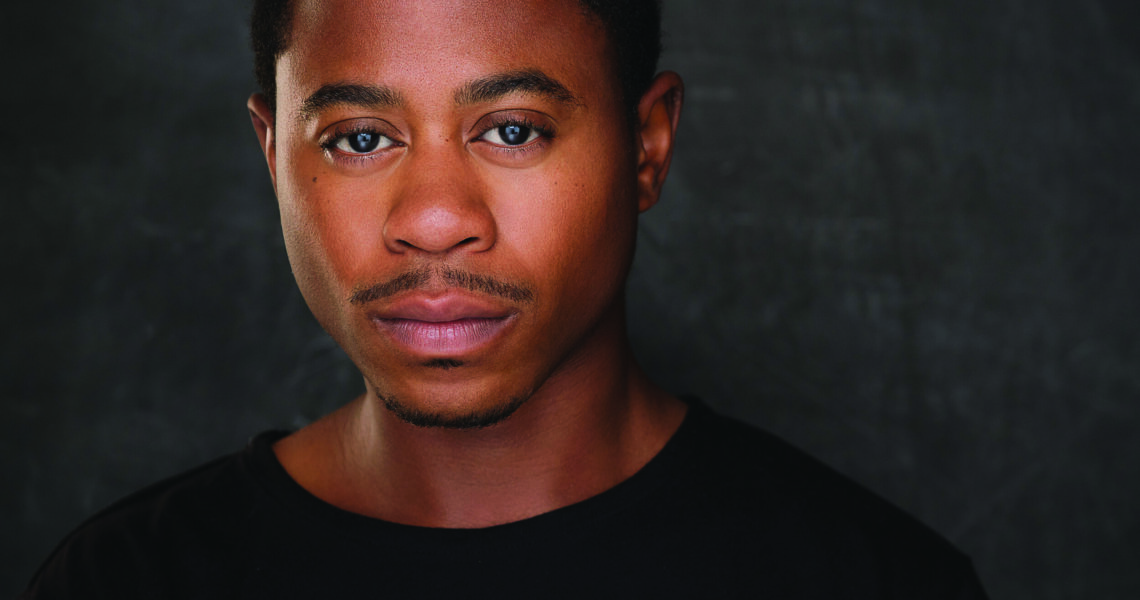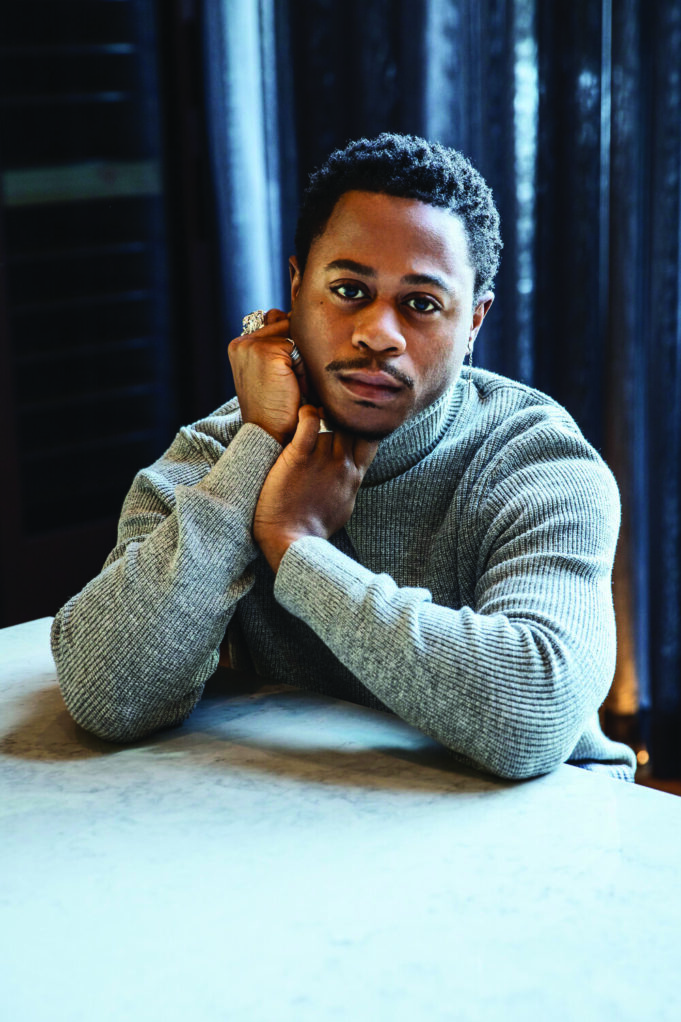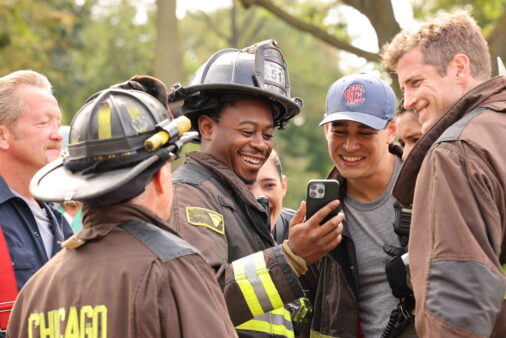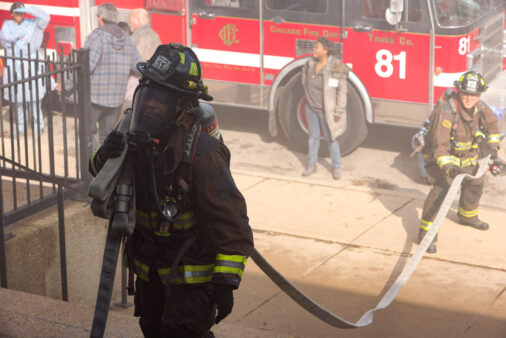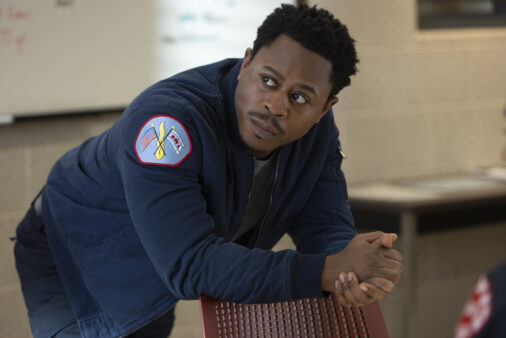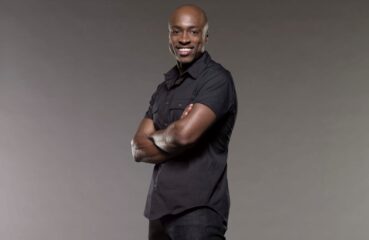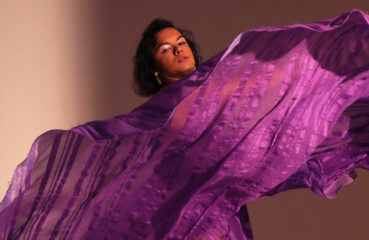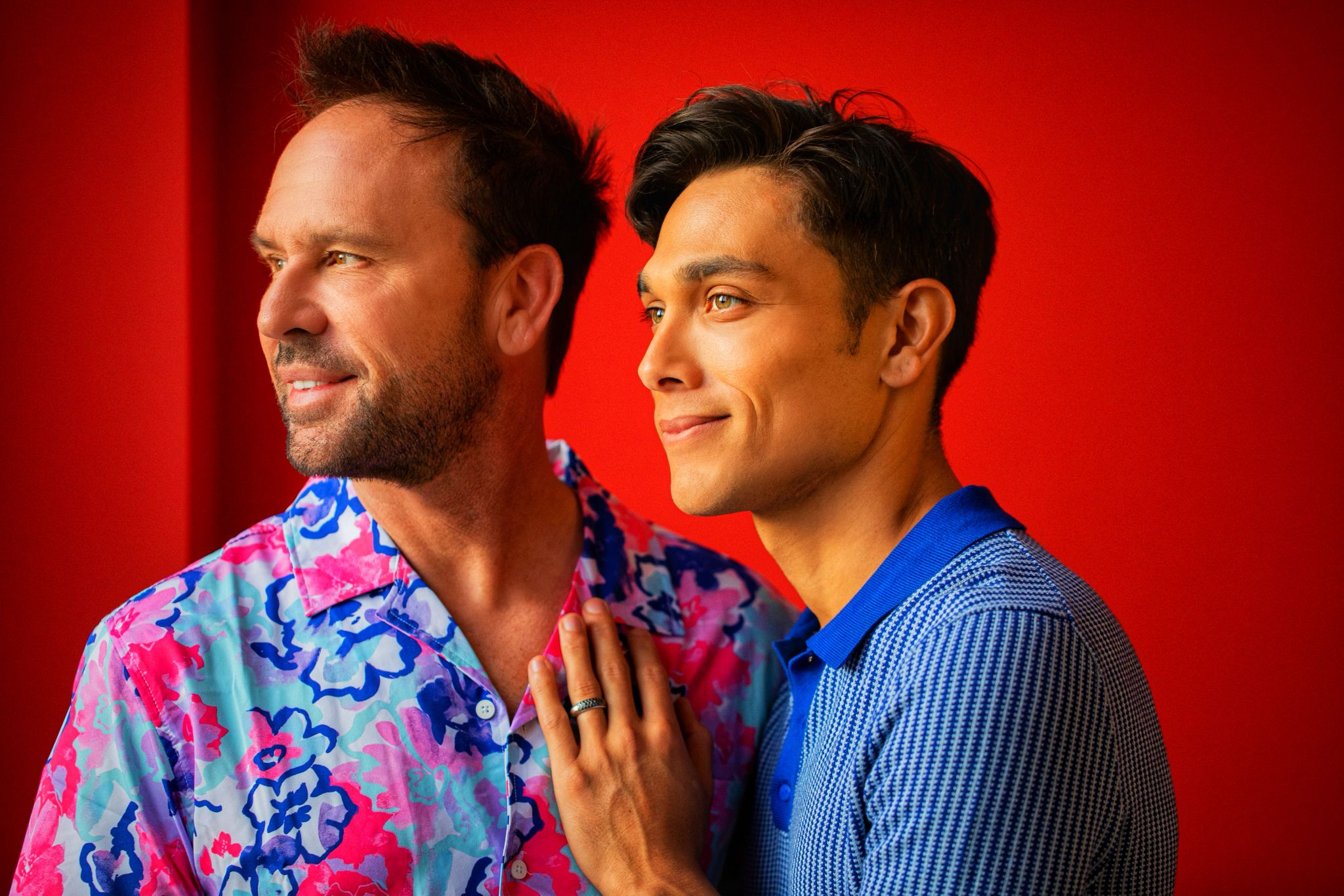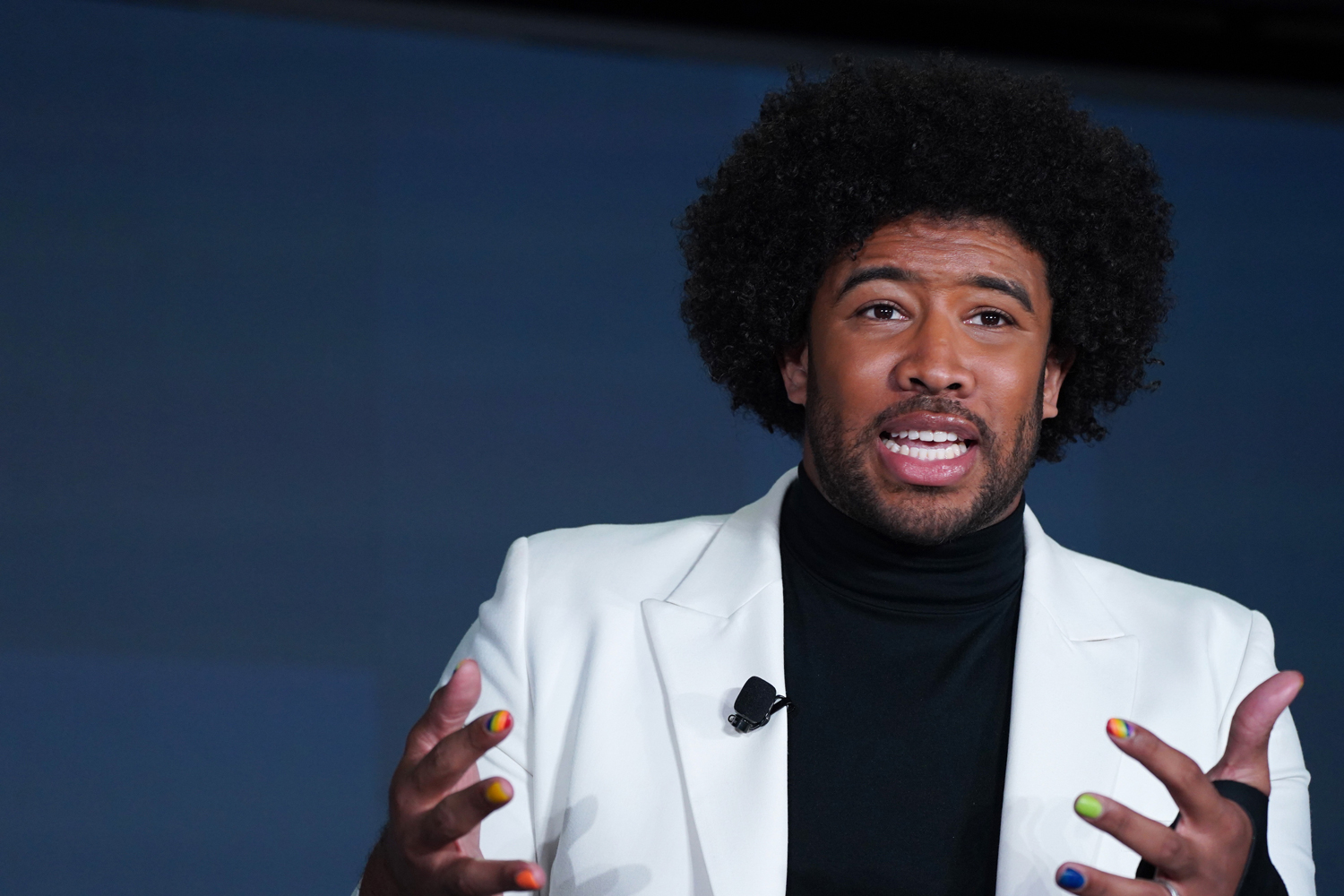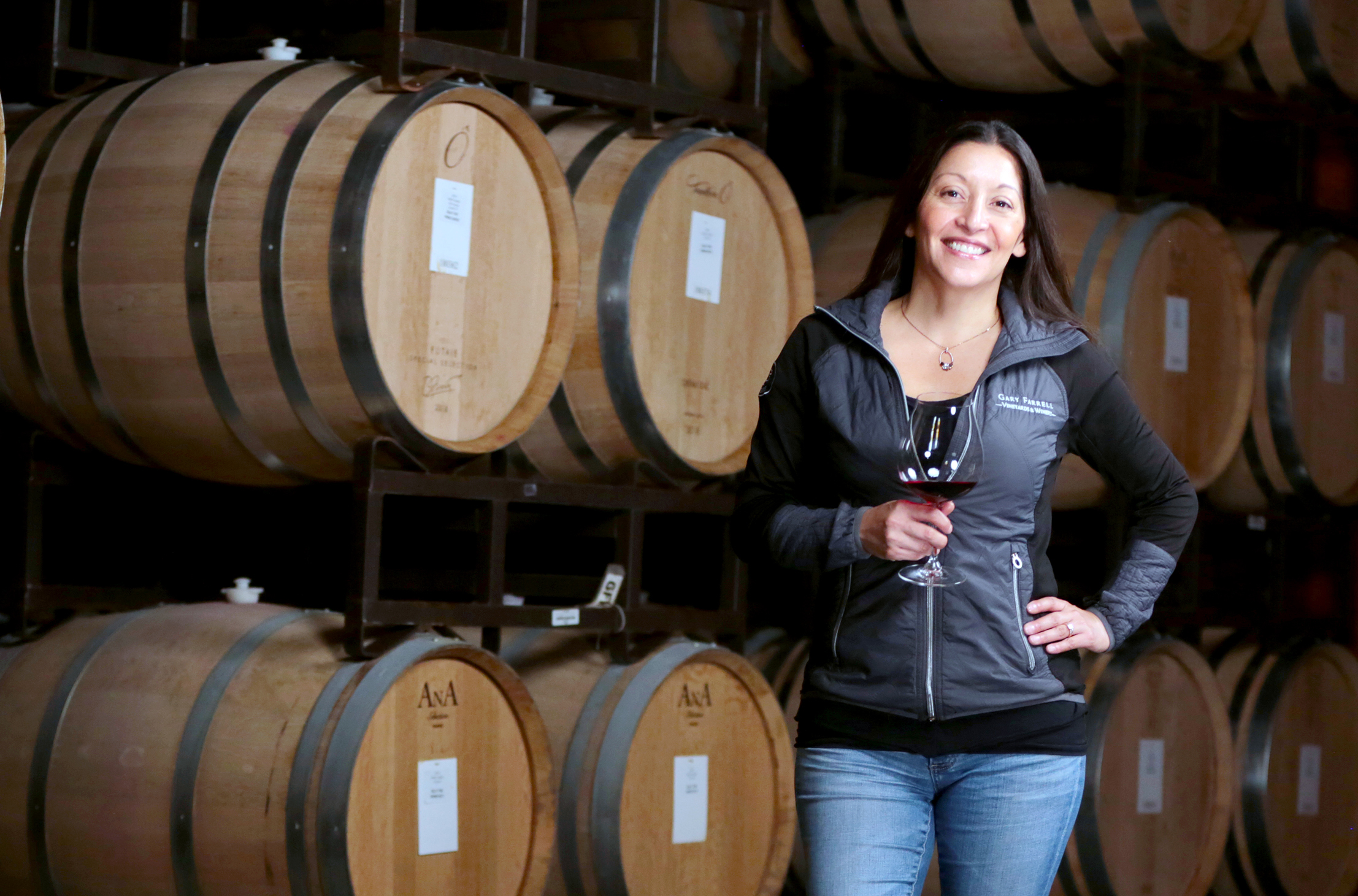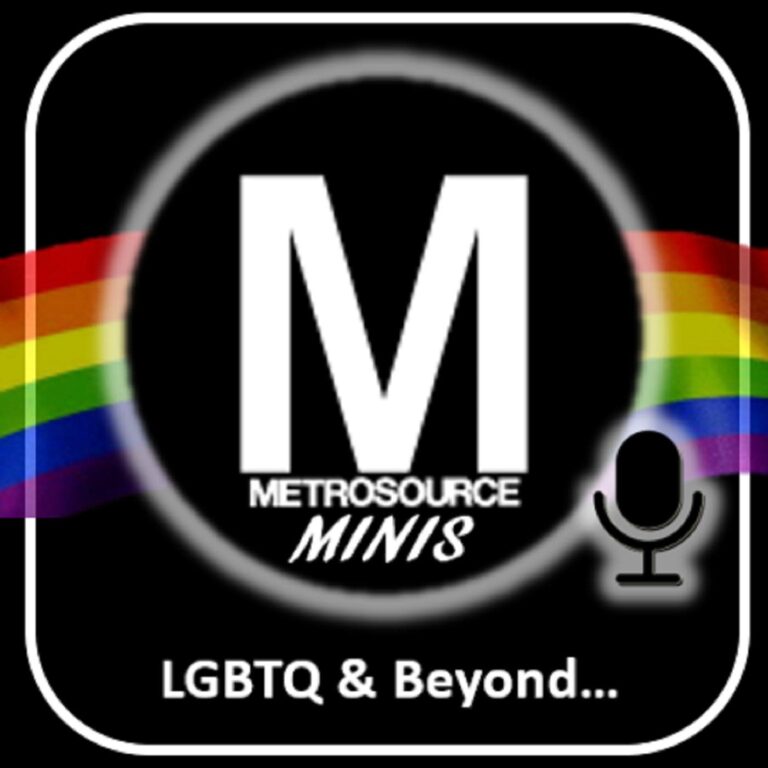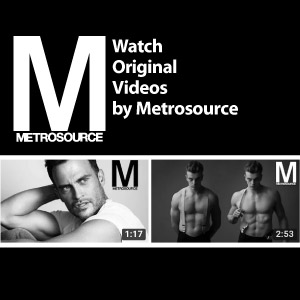Chicago Fire, as part of television’s Chicago franchise and executive produced by TV great Dick Wolf, has become a staple of NBC’s collection of fan-favorite shows. Now gearing up for its 12th season, it centers around the personal and professional lives of firefighters in the Chicago area. Having earned the role of firefighter Darren Ritter, Daniel Kyri is now enjoying his fifth year with the show, though the role was originally intended to only be around for two or three episodes. He is an out and proud actor who plays an openly gay firefighter in a typically hyper-masculine environment. Viewers of Dick Wolf shows are fervent, to say the least, and they have embraced Daniel and his character, quickly making him a fan favorite.
As art imitates life, Daniel is a staunch Chicago native, with his background giving him a unique perspective into the show and his identity as a Black, gay man in the South Side.
I had a lot of opportunities to learn things pretty quickly. Your boy is street-wise – I know how to get around. I know what’s what. And I think that that’s actually helped to shape me into the capable adult that I am.
Now that being said, I grew up really close to family. My G-MA stayed right across the way from me and we would go over there when my mom had to work and have sleepovers. She would be watching Svengoolie and odd, local Chicago things, stuff like that. I loved having that time with family, being so close, and also knowing that I could play on my block and there’d be a cousin or an uncle. Family was always really around and that was one of my favorite parts of growing up there. I felt taken care of.
His relationship with performing started when his mother enrolled him in the After School Matters program when he was 15. There, he would not only fall in love with his future profession and hone his skills as an actor, but he would find his identity in a safe space, even when masculinity from men in the South Side was expected.
I’m a little bit older than some of the younger queers coming out and there are conversations and dialogue and discourse that exist now, not unilaterally across the board, of course, but just the celebration of people being who they are. There is more conversation around that. Around the time I was 15, I wasn’t just discovering the arts, you know what I’m saying? I found out some things about myself that didn’t necessarily jibe with the way that I was brought up. Interestingly enough, the arts actually served as a bit of a bridge between me and my family growing up. They believed in me, in that regard, and it was something that I was passionate about and was good at. So, they encouraged it.
My journey with who I am has been a hard-fought arrival. When I was younger, it was more so a label that was put on me that I felt like I had to buck or I felt that I needed to present in a way that was not queer or gay or effeminate. Where I grew up, when I grew up, it was a lot of people bothering me and using “gay” as synonymous with something bad or not good. Of course, this isn’t a unique experience whatsoever, but it took me longer to fully understand and recognize the parts of me that were just kind of inherently me and very real because I spent so much time denying those parts.
Even though I encountered some [gay] stuff when I was 15, I spent years trying to convince myself otherwise. You have that wild pendulum of just swinging back and forth and back and forth, and that part of you doesn’t get enough light so it starts to fester or wilt in the dark. One of the series that I created when I was figuring out how to be an artist is called The T and it’s really about that time of experiencing elements of not taking care of myself in the best way that I could in regards to my queerness or my practices or in relationships with people. It was a long and twisty road to get me happy and healthy in my queerness and open and dare I say, proud.
Daniel cut his teeth in a variety of roles, becoming a fixture in the Chicago theatre world. From Moby Dick, Macbeth, Objects in the Mirror, to playing the title role in Hamlet, he learned the foundation of how to be an actor, learning the craft from a theatre environment that he believes has elements that are unique to Chicago.
The really fantastic thing about Chicago is that if there’s any kind of ego at all, in the very least, the art comes first. And I have learned the most valuable lessons about how to take care of your instrument, your body, yourself, in order to show up and meet the demands of the work. When I did Moby Dick at Lookingglass Theatre, I had never done such physical theater before. It was out of the frying pan into the fire, and you just go and you learn. The amount of support that I had around me in that process was pretty amazing. Just the way everybody rallied around, I do feel like that can be an experience sometimes that is a little bit unique to Chicago theater because there is a sense of community, for better or for worse, that exists here.
His acting style is fluid and a paradox to being a member of the LGBTQ community. Without a sense of fluidity, or being able to evolve or exist outside of methods or labels, you can never grow. Even with his experience in classical theatre to evocative newer pieces, he doesn’t subscribe to just one school of acting.
I’m a little Frankenstein and I kind of feel like the actors I have encountered, ones I love watching the most, are usually those who just borrow and steal and then turn it into something that is uniquely them and that they are uniquely suited to. One of the biggest things that we tend to overlook when we’re talking about technique in the craft is essence, right? The things that make you uniquely you are some of the most important aspects of building a character, building a role, stepping into a world, and fully inhabiting it. You have to bring parts of yourself to it. The really fun part for me is finding the variances and nuances that exist from person to person and how they handle different situations. In terms of whether it’s Stanislavsky or Meisner or whatever it is, really and truly, I think whatever just helps you get there is the best method.
Daniel was deep into his critically acclaimed performance in Hamlet when the audition for Chicago Fire came about. Little did Daniel know what this audition would do for his screen career, and how close he came to not even going in. Life circumstances were casting a shadow.
I was looking around at my life and I said, I’m broke. I was thinking, I need to just go work in somebody’s restaurant and make some money. So, I was not going to do the audition. My agents were like, you should do it. They were saying, why don’t you just look at it and see if you like it? I looked at the material for the role, and it was Ritter and it was awesome. It landed on me in a way where I was like, okay, let me just play around with it. And then I played around with it and I really loved him.
I went into the audition and it was all blonde hair, blue eyes everywhere. I said, okay, this role is not for me. Sometimes that’s just how it works. Sometimes there’s a specific look or whatever, it is what it is. That’s the industry. I didn’t think I was going to get it but I went in and I just did it. I went before the director of that first episode, Reza Tabrizi (who’s an executive producer on our show now), and he was like, YOU. And I was like, wait, what? I was really grateful that my reps said to go and do this audition because here I am five seasons later. How crazy is that? It feels amazing. It feels really, really good because I’m at home and I’m at home in the role and there are so many parts of Ritter that speak to parts of me and vice versa. It’s a really fantastic job to have.
His first day on set is a Hollywood story in itself. He had literally just rolled into bed from his Hamlet performance when it was time to roll back out of bed for a 4:45am call time. It was the first day back on set for the cast who had all built their family during the previous seasons. Daniel was a lone sheep getting ready for his debut moment. This wasn’t stage work anymore – no lengthy rehearsals, no improv if the lines went wrong, no fixing it for the next show.
I was in the van on the way to the set, make sure I know my lines, make sure I know my lines, like that kind of energy. It was a very nerve-wracking day. There were four cameras in my face, they’re pumping smoke through a stairwell, it’s like 90 or almost 100 degrees outside, and it’s hotter in the stairwell. There’s these lights and it was my first time on a big set, so I just had to get locked in and narrow down my world so that my zone of focus became really tight. I got through the day. But it was fantastic. It was like something out of a dream for me.
Not only was this Daniel’s first major television role for a major franchise on a major network, but it was also taking that leap and exposing himself to the nation. His sexuality and his private life were up for grabs as the fans wanted to know all about him, especially as his character came out on the show during Daniel’s sophomore season.
There’s no going back. At first, I was really scared because I felt even though I want to be out there and I want to be received for my work, I was also pretty private about certain things in my life and protective over that part of me. And then I just was thinking about it and working on that scene and then I got excited, which I think is often the case, sometimes when you make it to the other side of fear, you find your excitement. So, I got excited and I was just like, what a wonderful story to get to tell and to step into wholly. And because I’m a person who believes in representation, I was like, yeah, I am a queer Black man who gets the opportunity to play a queer Black man on this show that has such a massive impact. Then it just became about wanting to do it justice.
From the stage to the screen, after five seasons how has he changed the most as an actor?
The biggest thing is confidence, that’s been the biggest change for me. This is the first television show that I’ve done and so there is always something new to learn. Even now, I’m still learning a lot, but I think when you’re first stepping into it, it can be a little daunting. Now I live for those moments where I learn something new on our set and I look around and there’s the crew, the DP, and the gaffers and the grips, and everyone who has something to teach if you’re willing to open up your eyes and learn a little bit. That’s one of my favorite parts of my job now, is that I just get to be curious. I have confidence in that curiosity. It’s not about getting it right because I think that can take you out of yourself. It’s about being present and being receptive and being open. That curiosity leads to openness and openness for me leads to confidence in my role.
And how has the show changed him as a person?
I have a better sense of my own self-worth and it largely exists outside of my work now, which is such a refreshing thing to have and to say. I’m surrounded by so many affirming and positive people day in and day out. This really is one of the best jobs because of the people. To be honest it has really poured back into me what I give out. I have grown a lot and I’ve learned a lot about myself – how to take care of me. And that also it’s okay to put yourself first sometimes.
Even years after his character’s coming out, Daniel’s personal sexuality is still bandied about by the media with headlines still feeling the need to highlight him being gay. Does it bother him that his sexuality is still the lead-in?
Its level of importance can sometimes be a bit inflated. But there is a purpose, depending on where a person is in their own journey around understanding queerness and stepping outside of themselves enough to actually investigate with curiosity. Then I think a headline like that might do its job and grab attention. Do I think it’s necessary all the time? Absolutely not. By the same token as an out Black man, I’m so chill with that. I find such joy in my identity now that I didn’t grow up with. It feels just good to see a headline like, here’s this man and he’s doing the thing. It’s good to see. It’s good to be a part of it, and I’m happy it’s about me.
Looking to the future, he has a lot on his vision board. A hidden talent, he has a powerful, soulful, and intoxicating singing voice. He can be heard on the Don’t Be Afraid of Love EP and has plans for a debut album, with five songs already completed. If you haven’t heard him sing yet, GO STREAM THAT EP. He also has his eyes on more work behind the camera, knowing that effecting change in Hollywood representation needs to happen both in front of and behind the camera.
And his message to his fans this Pride season?
Y’all are real ones. Thanks for holding your boy down, because you do. Go live. Go explore, and as always, be as curious as you can be about the world around you.
You can follow Daniel on IG: @DanielKyri
Last modified: June 22, 2023

